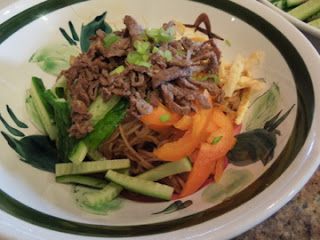A Refreshing Dish for Summer: Spicy Cold Bi-Bim-Noodles
Just about every (cosmopolitan) eater has heard of Bi Bim
Bop. (Click here for my post on Bi Bim
Bop: http://eatingreadingwriting.blogspot.com/2012/01/quasi-homemade-almost-too-easy-bi-bim.html) Less well known is its counterpart, the
bi-bim-nang-myun. “Nang” refers to
something cold, and “myun” is a generic word describing noodles of all sorts
(like cha-jang-myun, etc.). Putting all
this together, you can guess that bi-bim-nang-myun is mixed (“bi-bim”) cold
noodles.
Now that bi-bim-bop has ensconced itself in the
international culinary vocabulary, perhaps its cousin can soon join the
ranks. In fact, more and more, you see
in popular cooking magazines and websites recipes for cold spicy Asian
noodles. Bon Appetit’s July issue has instructions for making Cold Sesame
Noodles with Summer Vegetables. (Click
here to get that recipe: http://www.bonappetit.com/recipes/quick-recipes/2012/07/cold-sesame-noodles-with-summer-vegetables)
What seems a new-fangled dish in American magazines is something
that is very tradition-bound in Asian cultures.
I grew up eating my mother’s bi-bim-nang-myun decades ago, and she grew
up eating her mother’s dish, and so on.
Regardless of tradition, I agree that there is definite appeal to cold
noodles, especially during this Chicago summer with seemingly innumerable days
topping 90 degrees.
If you live near an Asian grocery store, get yourself a
package of “nang myun”—Korean dried wheat and buckwheat noodles. The noodles are grayer in color than the
Vietnamese dried noodles you might have seen before. They are also lighter, longer, and more
irregular than Japanese soba noodles you might be familiar with as well. In any case, if you are able to pick up a bag
of noodles, it might include packets of dry seasoning and smaller packets of
hot mustard oil with directions in both Korean and English for making a cold
noodle soup (pictured below). The cold
soup is the most popular way of enjoying these noodles during the summer.
Not normally in the package directions but still made by
Asians, is Bi-Bim-Nang-Myun:
1. Noodles.
Cooking the noodles requires nothing more than a pot of
boiling water and 3-4 minutes of cooking time.
Rinse several times with cold water, and let drain completely.
2. Sauce.
This gets trickier since everything is “to taste” when it
comes to this spicy sauce. You need
something called go-chu-jang (Korean fiery spicy red pepper paste). Some recipes call for Sriracha (hot chili
sauce) since that might be more accessible than go-chu-jang, but the two are
quite different. Sriracha is a bright
red versus go-chu-jang’s dark brick red; and sriracha is thin and squirtable
while go-chu-jang is definitely a much thicker, pasty substance, like miso.
If you are able to get your hands on some go-chu-jang, you
need to mix that with minced garlic, chopped scallions, rice vinegar, sesame
oil, a bit of sugar and salt until the seasoning is to your taste. It should taste much more heavily spiced than
you could possibly imagine eating on its own since you are about to mix a lot
of ingredients with the sauce.
Mix the
sauce and the noodles and correct for seasoning.
3. Toppings.
Two items are indispensable: cooled, chopped bul-go-gi and sliced
omelets. You can get pre-marinated
bul-go-gi in many Asian stores to cook at home, or you can follow a very basic
recipe here: http://eatingreadingwriting.blogspot.com/2011/11/bul-go-gi-korean-fire-beef.html. As for the egg, all you need to do is scramble
two eggs with a little bit of salt, pour the mixture into a hot and oiled pan,
and let it brown on both sides. Cool and
then slice.
Aside from these two indispensable ingredients, I like
julienned cucumber (pickling or Persian cucumbers are best for this), carrots,
red or orange pepper, scallion. Once you
lay out your toppings on top of the sauced noodles, you can mix the whole
concoction together.
Although the noodles will be spicy, the coolness of the
noodles and the toppings will keep things under control…








Comments
Post a Comment